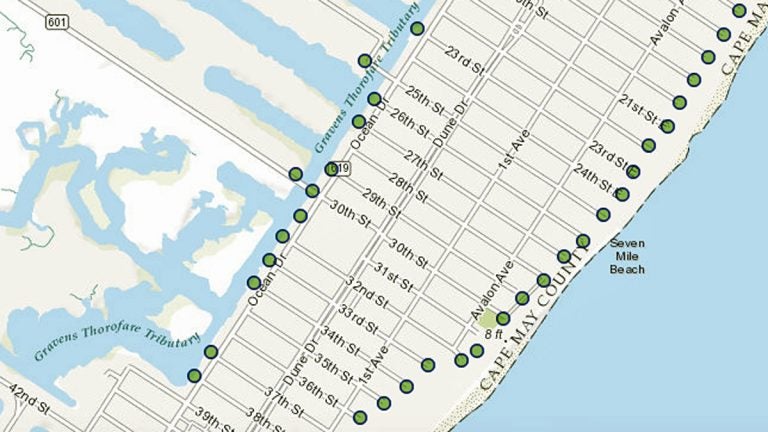New Jersey moving to legally protect the public’s right to beach access

Public access points from a N.J. Department of Environmental Protection map.
The New Jersey would take a step toward guaranteeing public access to beaches and the shoreline under a new bill drafted by lawmakers, but it leaves many key issues unsettled.
The bill (S-2490), introduced this week, would establish under law the longstanding public trust doctrine allowing the public to enjoy the state’s tidal waters and adjacent shorelines.
Map of all 2,900 N.J. beach access points
Those rights would be ensured by the state Department of Environmental Protection under a range of existing laws governing New Jersey’s coastal areas and wetlands, among others.
At the same time, the bill would exempt certain critical infrastructure, presumably power plants, refineries and ports, from the requirements based on security considerations—a provision strongly pushed for by business interests.
The bill, stemming from recommendations of a specially appointed legislative task force, reflects a consensus among the group. More substantive issues involving beach access are expected to be hashed out in a second, as yet, unwritten bill.
Prospects for reaching a consensus on those issues are iffy given the state’s long-running controversies over waterfront access, ranging from towns restricting easy entry to beaches by high beach fees, limited parking, and too few points of entry.
Still, conservationists are happy to enshrine the public trust doctrine into law and give the DEP the legal clout to ensure it happens. “It’s clear that the beaches belong to the public. This would set the floor,’’ said Debby Mann, NY/NJ Baykeeper, one of four co-chairs of the task force. “The state is responsible for providing access to beaches and waterfront areas.’’
The proposed bill exempts certain infrastructure and facilities from the access requirements in cases where the public should be excluded based on security reasons as designated by the New Jersey Office of Homeland Security and Preparedness.
“The issue is how do you define that critical infrastructure,’’ said Michael Egenton, executive vice president of the New Jersey State Chamber of Commerce and a co-chair of the task force.
Sarah Bluhm, a vice president of the New Jersey Business and Industry Association, another co-chair, said the issue of exemptions was important to the business community, but others remain.
The bill retains the authority of the DEP to require facilities to provide off-site access to the waterfront in cases where the public is excluded because of security concerns. “It is a big issue also,’’ Bluhm noted, questioning how often businesses might have to provide off-site access. “Is it every time your permit comes up for renewal? Is it for a set number of years?’’ she asked.
The bill also would require projects that receive public money to be consistent with the public trust doctrine of providing access, a provision important to environmentalists. “For too long, the towns wanted public money to fix their beaches, but don’t want the public who paid for it to have access,’’ said Jeff Tittel, director of the New Jersey Sierra Club. “This will help address that.”
Still, despite the bill’s being an important step forward, Tittel suggested there is still a lot of work to do to fully ensure public access to waterfront areas. “There are no standards,’’ he said. “What’s the proper access? Is their access to parking? To bathrooms? That’s going to be the real battle.’’
The Senate Environment and Energy Committee is expected to consider the bill at a meeting on Aug. 18.
WHYY is your source for fact-based, in-depth journalism and information. As a nonprofit organization, we rely on financial support from readers like you. Please give today.




